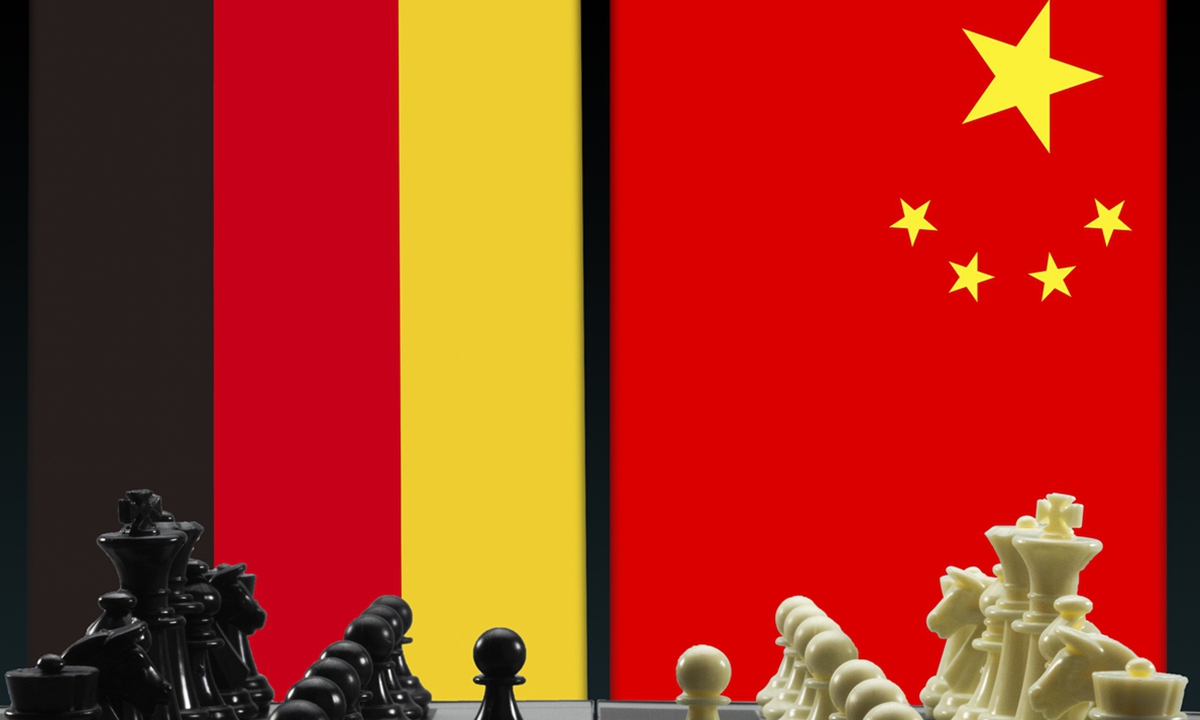
China-German Photo: VCG
German Minister for Economic Affairs and Climate Action Robert Habeck has frequently fired shots at China recently. After a meeting with his G7 counterparts last week, Habeck claimed that "the naivety toward China is over." His ministry was also considering new measures to make business with China less attractive, including closer examination of Chinese investments in Europe, as it seeks to reduce its dependency on the Chinese market and products. But Habeck's remarks are both unprofessional and nonsensical.
Obviously, Habeck is "mature and sophisticated" to some degree as he has captured the need for "hardline stance" of some people in the US and Europe. However, it's not only illogical, but even a bit inferior for an economy minister to admit that his country was once "naive" and had long benefited from that "naivety." Take auto manufacturing, German economy's major pillar, for example, Volkswagen's sales in China account for 49 percent of its total sales, while Audi, Mercedes-Benz and BMW account respectively for 42 percent, 36 percent and 34 percent. And it's a similar situation for companies like Bayer, BASF, Siemens and many other German hidden champions.
What does this mean for Germany? The answer is that the Chinese market makes sure that big German enterprises don't have to seriously compete with each other. In addition, the average German employee who works 35 hours a week can still be guaranteed high pay and benefits, and there is a firmer status for the German manufacturing industry known as "the factory of all factories." At the same time, over one tenth of Germany's imports come from China, the Germans can thus purchase lots of cheap and high-quality goods. It's not difficult to figure those things out, as the Chinese market brings practical benefits to Germans.
In fact, even some Western media trying to amplify Habeck's statements had to mention that China has been Germany's largest trading partner for the past six years in a row, with bilateral trade reaching $235.12 billion in 2021, up 22.5 percent year-on-year. In the first half of 2022, Germany's direct investment in China reached a record high of 10 billion euros, and imports from China also increased by 46 percent year-on-year. Habeck and his likes deliberately interpret the "complementarity" and "integration" of the Chinese and German economies as Germany's "excessive dependence on China," which overlooks the fact that in the context of globalization, the industrial chain is interlinked and interdependence contributes to the stability of bilateral relations. On the contrary, the forced "decoupling" for ideological reasons will bring greater instability and uncertainty.
The past and reality of China-Germany economic and trade cooperation make Habeck and his likes, who advocate a "not naive" policy toward China, seem rather "naive." This is why many industry organizations such as the German Association of the Automotive Industry and the Employers' Associations of the Metalworking and Electrical Industries and many German companies have explicitly criticized the move, saying that the deterioration of economic and trade cooperation with China "would be naive and fatal, both politically and economically." The current German economy is already facing difficulties, and Habeck's approach, which is obviously contrary to Germany's national interests, will make people more worried about the German economy under his helm.
One of the main excuses for "reducing dependence on China" advocated by Habeck and his likes is to reduce risks through trade diversification. But the "diversity" should not become "politicized." Relations with China, especially economic and trade cooperation, should not become the hardest hit area for "hardline political shows" by individual political parties and certain politicians. It goes without saying that there will always be differences and disagreements between two countries, but those between China and Germany today are no greater than they were 50 years ago. While both countries have successfully managed their differences and expanded cooperation in the past and benefited from it, it's worrying that there is a dangerous tendency for Habeck and his likes to confine the cooperation and expand the differences.
Perhaps seeing this, German Chancellor Olaf Scholz came forward to offset the impact of Habeck's radical opinion, warning of any decoupling from China or deglobalization in general. We hope that the rational and pragmatic voices will always prevail, because compared with those politicians who are obsessed with political stunts and seek political self-interest, they conform to the trend of economic globalization and focus on the overall national interests of Germany.
This year marks the 50th anniversary of the establishment of diplomatic relations between China and Germany. In the past 50 years, the bilateral trade volume between China and Germany has increased by more than 800 times. The two sides have achieved common development and made mutual achievements through continuous deepening of pragmatic cooperation. The key is to adhere to mutual respect and win-win cooperation. We hope that Habeck and his likes can have some sense of history and responsibility, truly sum up historical experience, and earnestly respect objective laws, instead of driving their "chariots" on a rampage with ideological and confrontational thinking. This is not good for anyone.




